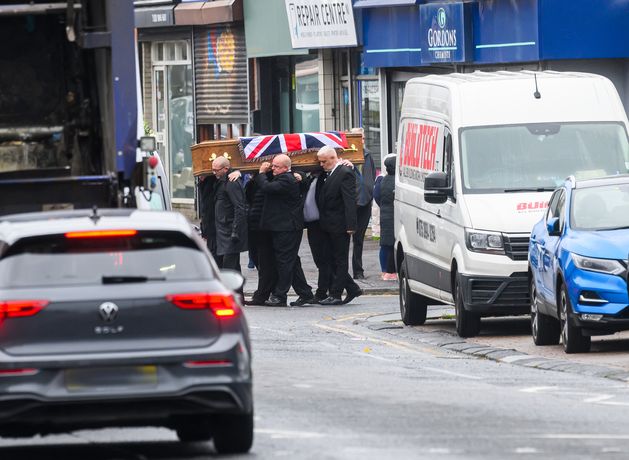<a href="https://www.world-today-news.com/a-killers-farewell-loyalist-murderer-uel-cooke-will-forever-be-remembered-for-sick-uvf-slaying-of-armagh-mum-of-two-anne-marie-smyth/" title="A killer’s farewell: Loyalist murderer Uel Cooke will forever be remembered for sick UVF slaying of Armagh mum of two Anne Marie Smyth”>Uel Cooke‘s Funeral Reflects Divided Legacy of a UVF Leader
Belfast, Northern Ireland – The funeral of Uel Cooke, a prominent figure in the loyalist paramilitary group UVF, drew mixed reactions from mourners on Tuesday, reflecting the deep divisions still present within the community. As his coffin was transported from his Ardgowan Street home, a Union flag draped over it, the atmosphere was laden with tensions, highlighting the lingering impact of his violent past.
A Complex Legacy
Uel Cooke, 65, known affectionately as "Cookie," held a significant position within the UVF, particularly in the East Belfast Battalion. Originally hailing from Shankill Road, he moved at the request of UVF leadership and became a notorious figure associated with some of the most horrific acts of violence during the Troubles. Those who gathered for his funeral included friends and family, however, many chose to maintain a distance, illustrating the uneasy peace in a community marked by allegiance to differing UVF factions.
Friends and family sought to comfort Cooke’s widow, Jacqueline, and children, Samantha and Aaron. But the underlying tensions were palpable, with mourners avoiding eye contact with former colleagues amidst a backdrop of political strife. Chasms within the UVF were prominently visible during last Remembrance Day when attempts were made to remove the East Belfast leadership, signaling ongoing struggles for power and control within the group.
A Life Shaped by Violence
Cooke was remembered for his violent deeds that marked the height of the Troubles, including his involvement in high-profile murders. Notably, he was part of a group that assassinated IRA leader Brendan ‘Ruby’ Davison in 1988. His career in the UVF began at a young age; tragically, he was implicated in the murder of a Protestant man suspected of connections to the police, further solidifying his controversial legacy.
In stark contrast, his funeral found more modest floral arrangements, largely devoid of any mention of his criminal past. According to his pastor, Cooke had undergone a significant transformation in his later years, dedicating himself to Christianity, which he reportedly embraced in the wake of his diagnosis with cancer.
A Somber Gathering
The final resting place for Cooke was Roselawn Cemetery, where he shares a grave with a family in-law. The gathering of mourners included those who had distanced themselves from their former lives of violence, highlighting a narrative of redemption conflicting with his violent past. As they laid him to rest, there was no public acknowledgment of the atrocities committed during his life, except for the attendees’ quiet remembrances.
In a poignant detail from the service, a study on Cooke’s past noted that his actions continued to evoke mixed feelings. While some amongst the UVF honored his memory, others recognized the pain inflicted upon countless families, a point underscored by the shadow of Anne Marie Smyth, the young mother and innocent victim of Cooke’s earlier odyssey within the paramilitary landscape.
Echoes of Tragedy
Anne Marie Smyth, a 25-year-old mother of two, became a reminder of the human cost of such violence. A resident of Armagh, she came to Belfast for a night out but fell prey to the sectarian brutality personified by Cooke. Her encounter with the UVF resulted in her tragic murder, an event that still haunts the community decades later. Cooke’s role in this heinous crime further complicates how he is remembered, creating an ongoing dialogue about justice and reconciliation in Northern Ireland.
Community Reflections
In attendance were Cooke’s fellow churchgoers, who were caught in an emotional tug-of-war between their faith and the criminal activities that Cooke had left behind. The omission of any mention of Cooke’s acts at his funeral speaks volumes about the careful navigation required in a community still reeling from the legacy of its past.
As the funeral concluded with some attendees wiping away tears, it served as a haunting reminder of the fractured relationships left in the wake of paramilitary violence. The expressions of sorrow were not universally shared, illustrating the complex nature of mourning a figure like Cooke, whose life and actions elicited mixed emotions.
Moving Forward
The legacy of Uel Cooke epitomizes the struggle still prevalent in Northern Ireland, as communities wrestle with their troubled past. It opens up conversations about healing, accountability, and the future of sectarian relationships. As the haunting history lingers, it remains clear that while some choose to remember Cooke as a loyalist hero, many more will always view him through the lens of the deep suffering his actions incurred.
For further insights into the enduring impact of the Troubles in Northern Ireland, readers can explore related articles on our website.
Readers are invited to share their thoughts on Uel Cooke’s legacy and the continuing impact of paramilitary violence in Northern Ireland. Join the conversation below.

